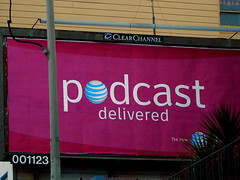David Hornik wrote a post comparing VC and buyouts to the TV show
Deal or No Deal.
Now, my sons like watching this show, and I don't mind as it is a great lesson in probability. The expected value is pretty easy to calculate (sum of remaining amounts divided by number of remaining suitcases), so you have an objective valuation to compare the banker's offer against. Doing the calculation in your head isn't that hard, as you only need to sum up the top few amounts — lower ones don't significantly affect the outcome. The offers from the banker are consistently below the actual expected value, until they get down to a small number of cases.
At it's core, this program is in the same
Greek God model of reality TV I have discussed before; unlike "Who Wants to be a Millionaire", which has a skill element alongside the "stop or continue" calculation, it is playing on the fact that knowledge of probability is not something that has been evolutionarily selected for, and thus needs to be painstakingly learned (if you doubt this, look at the city that probability built, Las Vegas). This reveals itself in Howie Mandel saying flagrantly untrue things like "there is a good chance you have a million dollars in your case" when there are 20 left, and so the chance is 5%, and indeed in the way the producers seem to be trying hard to get someone to win a million (which is hugely unlikely given the game's form, as when you are left with 2 cases, the buyout offer is very easy to calculate) - to the point where they are adding in cases with $2 million and $3 million in.
So how does this fit with Hornik's analogy? One thing that is clear is that if there isn't an objective way to value what you have, it helps if there is more than one banker to make you offers. If it is just Google, Yahoo or Microsoft, then the entrepreneurs may be in a take it or leave it situation, but if there are competing bidders, they have a better chance. It is this that makes sense of the
otherwise inexplicable flotation of a public company of ex-Apple execs with no products or services, who want to buy up companies using IP.
PS If you look at
the Deal or No Deal application form, it makes it very clear that watching you and your family and friends agonise over the decisions is the whole point of the show, and interestingly, alongside questions about criminal convictions also asks:
Have you ever created a website or posted any materials on any website? YES NO (Circle One) If YES, describe the website(s) you created and/or the materials you posted.
Have you appeared in any magazines, publicly disseminated photographs, advertisements or the Internet?
Technorati Tags: television, VC, Venture Capital
